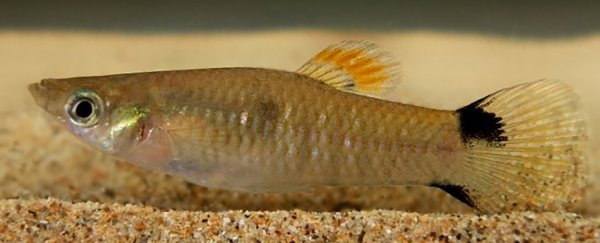What we know for certain is that there are small guppy fish – Poecilia vivipara – on the Fernando de Noronha archipelago, off the coast of northeast Brazil.
What's less clear is how they made it so far away from the mainland, a distance of 345 kilometres (214 miles).
These small freshwater fish look ill-equipped for such an arduous journey across the ocean to these isolated rocky islands, formed by volcanic activity - but now scientists think they may have solved the mystery.
New DNA analysis at the Universidade Federal do Rio Grande do Norte in Brazil found that the fish are closely related to the nearest populations on the continent, and researchers have suggested a scenario whereby the guppies could have been transported to Fernando de Noronha with a little human help.
 Fernando de Noronha. (Luciano Barros-Neto)
Fernando de Noronha. (Luciano Barros-Neto)
What's most likely to have happened is these guppies were brought to the island to control the local mosquito population, carried over by US soldiers stationed at Fernando de Noronha and the nearest city of Natal some 60 years ago.
Records show the military also used the chemical DDT to control mosquito numbers and malaria. Considering guppies are well known for eating mosquito larvae and eggs, it's possible the fish were deployed as well.
The close genetic match between the island fish and the guppies on the mainland would suggest they arrived fairly recently, backing up the human intervention hypothesis.
However, while the researchers say this is the most likely scenario, they're not completely ruling out natural dispersion, pointing to previous examples where freshwater fish have made their way across the ocean.
While the chances of survival are slim, fish and their eggs can be transported by birds, rafts, storms, and changing ocean currents, say the researchers. Changing sea levels and sea level saltiness could also have given guppies a window of opportunity.
Perhaps we'll never know for sure, but scientists have long been fascinated with how organisms make their way to these remote rocky outcrops of land; this research can feed into that.
"Regardless of their means of transportation, this guppy population represents a valuable lesson on how small populations manage to colonise and thrive in isolated environments," say the researchers.
And it's the DNA of these archipelago populations that could unlock the secrets of their heritage, according to the team of scientists behind this latest study. They can reveal genetic links that cross many miles of ocean or hundreds of years in time.
"Despite being visited by thousands of people every year, some of the most intriguing secrets of tropical islands may still be hidden in the DNA of their inhabitants," add the researchers.
The research has been published in ZooKeys.
